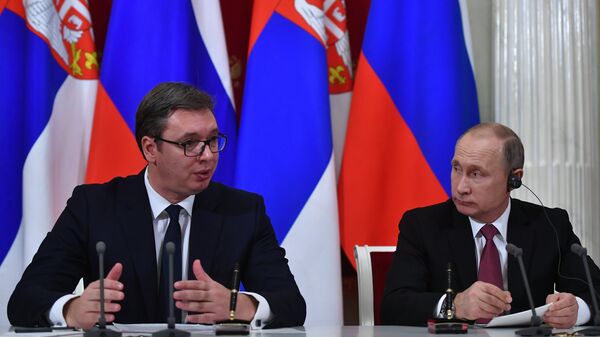"In future, Serbia, apart from being a major market for the Russian gas, may become an important transit hub. The issue of connecting the Serbian partners to the new energy pipeline route project, the Turkish Stream, being implemented by Gazprom, is being considered," Russian President Vladimir Putin said after his meeting with Serbia's President Aleksandar Vucic during the latter's official visit to Russia.
According to the Russian president, the volume of Russian gas supplies to Serbia may reach 3.5 billion cubic meters by 2022.
"I am glad to stress that our relations are developing, first of all, in the sphere of the economy. The trade turnover is growing, direct investments are also on the rise," Putin said.
According to the annex to the contract on Russian gas supplies to Serbia, signed as part of Vucic's visit, Russian energy giant Gazprom will increase annual gas supplies to Serbia to 2 billion cubic meters starting from 2018.
READ MORE: Serbian FM Slams American Demand for Belgrade to Choose Between Russia, US
The Turkish Stream assumes the construction of the two conduits of the main gas pipeline along the bottom of the Black Sea, with an annual capacity of 15.75 billion cubic meters of gas each. One channel is designed to deliver gas directly to the Turkish market, the other is for transit gas supplies through Turkey to the European countries. The construction of the first portion was launched in May and is expected to be put into operation in March 2018, while the second — in 2019.
In early July, media reported that Russia's energy giant Gazprom and Hungary signed an agreement on Russian gas deliveries to the country via the Turkish Stream gas pipeline through Serbia and Bulgaria, with Gazprom also considering other ways of gas supplies.
Russia and Serbia have long had friendly relations, dating back to the 19th century when Serbia gained independence from the Ottoman Empire. The countries are also developing economic, defense and diplomatic cooperation.
On the Balkan Issue
"Russia is interested in the stabilization of the situation in [the Balkans], in development of mutually favorable ties with all the Balkan states," Putin said after his talks with Serbian President Aleksandar Vucic.
Russia will continue supporting Serbia in maintaining its sovereignty, and territorial integrity, Putin stressed, adding that Russia would support any joint decision of Belgrade and Pristina over Kosovo.
The Russian president stressed that the situation in Kosovo must be resolved through political means, on the basis of a dialogue between the parties, and in accordance with the resolution of the UN Security Council.
The Balkans have been facing instability for decades due to a number of ethnically-based conflicts, which have rocked the region, particularly those related to the dissolution of Yugoslavia in the 1990s.


